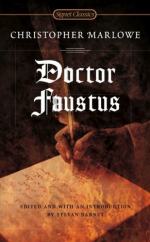|
This section contains 7,145 words (approx. 24 pages at 300 words per page) |

|
SOURCE: "Panurge and the Faustian Dilemma," in Stanford Literature Review, Vol. 2, No. 2, Fall, 1985, pp. 147-63.
In the following essay, Ryan compares the respective attitudes of the protagonists of Rabelais's comic romance Tiers Livre with Marlowe's Faust toward the possibility of spiritual salvation.
As Christopher Marlowe's Tragical History of Dr. Faustus begins, the protagonist is discovered in his study lamenting his failure, through ordinary means, to satisfy the boundless desires of his intellect and will and so turning as a last resort to magic. The insatiable hunger of this dramatic character for impossibly attainable knowledge, power, and self-gratification has entered our modern mythology as the Faustian dilemma.
What can a creature, limited in capacity yet infinitely aspiring, do to exceed the limitations of our nature and achieve things inaccessible to ordinary mortals? And does making the effort to seize the absolute, "to gain a deity," inevitably lead to disillusionment...
|
This section contains 7,145 words (approx. 24 pages at 300 words per page) |

|


